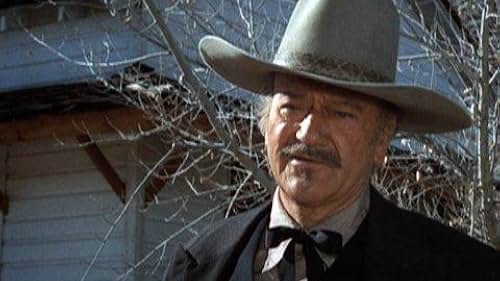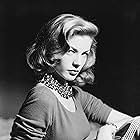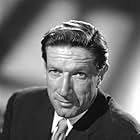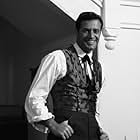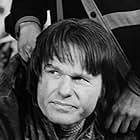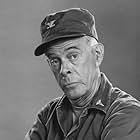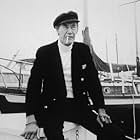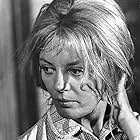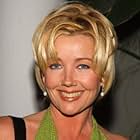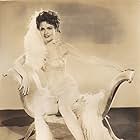A dying gunfighter spends his last days looking for a way to die with a minimum of pain and a maximum of dignity.A dying gunfighter spends his last days looking for a way to die with a minimum of pain and a maximum of dignity.A dying gunfighter spends his last days looking for a way to die with a minimum of pain and a maximum of dignity.
- Nominated for 1 Oscar
- 1 win & 5 nominations total
- Girl on Streetcar
- (as Melody Thomas)
- Man Outside Metropole
- (uncredited)
- Director
- Writers
- All cast & crew
- Production, box office & more at IMDbPro
Storyline
Did you know
- TriviaJames Stewart agreed to play a cameo role in the film only because John Wayne had specifically requested him. His brief screen time proved to be rather difficult. The bad acoustics of the huge, hollow sound stages worsened his hearing difficulties, and he stayed by himself most of the time. He and Wayne muffed their lines so often in the main scene between them that director Don Siegel accused them of not trying hard enough. Wayne's reply was a variation on an old John Ford line, advising the director, "If you'd like the scene done better, you'd better get a couple of better actors." Later on, the star told friends that Stewart had known his lines, but hadn't been able to hear his cues, and that in turn had caused his own fumbling.
- GoofsBooks' hair (John Wayne's toupee) goes from being parted on his left to his right then back to his left after he tells Marshal Thibido he's a dying man when they first talk in Books' room.
- Quotes
Gillom Rogers: [first lines, voiceover] His name was J.B. Books, and he had a matching pair of 45's with antique ivory grips that were something to behold. He wasn't an outlaw. The fact is for a while he was a lawman. Long before I met Mr. Books, he was a famous man. I guess his fame was why somebody or other was always after him. The wild country had taught him to survive. He lived his life and herded by himself. He had a credo that went:
John Bernard Books: I won't be wronged, I won't be insulted, and I won't be laid a hand on. I don't do these things to other people, and I require the same from them.
- ConnectionsFeatured in Sneak Previews: The Top Ten Films of 1976 (1977)
- SoundtracksWillow, Tit Willow
Music by Arthur Sullivan
Lyrics by W.S. Gilbert
Performed by John Wayne & Lauren Bacall
After a brief prologue made up of film clips of Wayne in his career prime, we meet his cinematic alter ego, John Bernard Books, an aging gunfighter who rides into Carson City, Nevada in the early 1900's looking for Doc Hostetler (James Stewart), the old sawbones who once saved his life and apparently the only man he trusts. It seems the old guy has prostate cancer and only a few weeks to live, and as Hostetler tells him, it will not be a pleasant death. Books, with no where else to go, checks into Bond Rogers' (Lauren Bacall) boarding house to live out his final days in peace under the alias "William Hickok." When Bond's delinquent son Gillom (Ron Howard, in a nice change-of-pace performance and his last major film appearance before becoming a director) informs her of his true identity, she tries to throw him out but relents when she finds out his condition and agrees to help him die in peace.
Unfortunately, things don't go as planned as everyone from the town mortician (John Carradine) to an old girlfriend (Sheree North) to a newspaper editor (Richard Lenz) try to take advantage of his situation and turn a fast buck. And then there are several lowlifes (Richard Boone, Hugh O'Brien, Bill McKinney, etc.) who want to seal their reputations by taking him out. Since it's obvious that no one will leave him alone in his final days, and since he grows fond (to put it mildly) of both Bond and Gillom and wishes them no harm, Books decides to go out in style and on his own terms, and to take a few scumbags along with him.
"The Shootist" is one of those rare films that seems to have gotten better with age. It wasn't particularly successful with critics or audiences at the time, as they were apparently put off by its leisurely pace and relative lack of action. Typical of the reaction was a TV guide critic (who shall remain nameless), who once derided it and its stars as coming across as "relics of the old West." (Wasn't that the point?) However, it is now pretty much considered a classic, and rightfully so, especially when viewed next to some of the lesser films of Wayne's 1970's period ("Cahill," "Rooster Cogburn," "The Cowboys"). In fact, it is now hard to believe that Wayne was not nominated for an Oscar here, as Books is clearly one of the best performances of his career and definitely eclipses his extravagantly praised, Oscar-winning mugging in "True Grit." Indeed, "The Shootist" deserves to stand alongside Clint Eastwood's "The Outlaw Josey Wales" and Oscar-winning "Unforgiven" as the last three great Westerns in cinema history. Everything about it is immaculate--the sets, the costumes, the supporting cast (including Harry Morgan in a terrific cameo as an unsympathetic sheriff who tells Books, "What I put on your grave won't pass for roses."), the script, and the chemistry between Wayne and Bacall, teaming up for the first time since "Blood Alley." And everything is held together by old pro director Donald Siegel who, aside from the late Hal Ashby, may very well be the most underappreciated director in cinema history.
But "The Shootist" is John Wayne's film all the way. He is simply sensational, and BRAVE, since he apparently knew at the time his cancer was back and that this would probably be his last film. It's not every film legend who gets to end his/her career on a high note, but Wayne did just that. I just hope he knew it before his death barely three years later. ****1/2 (out of *****)
Details
Box office
- Gross US & Canada
- $8,091,910
- Gross worldwide
- $8,091,910
- Runtime1 hour 40 minutes
- Color
- Sound mix
- Aspect ratio
- 1.85 : 1
Contribute to this page


